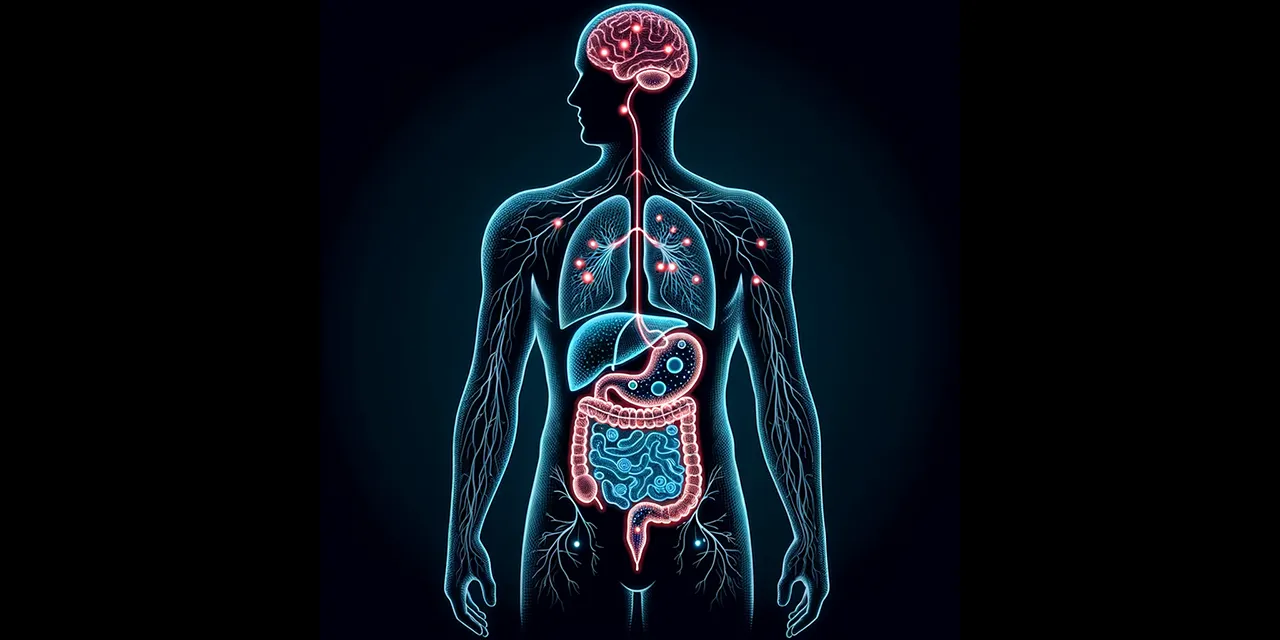Connection between gut and brain: New insights into neurodegenerative diseases
Detoxify, cleanse and build up your gut
The role the gut can play in Alzheimer's, dementia, Parkinson's, depression and anxiety disorders
The exact causes of neurodegenerative diseases such as dementia and Parkinson's as well as mental illnesses such as depression and anxiety are still not fully understood. However, the number of cases is rising exorbitantly and scientists are working hard to investigate the mechanisms behind these diseases and develop preventative strategies.
Research is now focussing in particular on the gut-brain axis, a remarkable connection that interacts closely despite the physical distance between the gut and brain. It is precisely this axis that enables the microorganisms in the gut to have a direct effect on the brain via biochemical signalling pathways, including hormones and neurotransmitters.
The influence of microbial dysbiosis on neurological conditions
The latest research on Alzheimer's dementia, such as a study conducted by Kiel University in April 2024, once again highlights the role of microorganisms that colonise the intestinal and oral mucosa in the development of neurological diseases1. Study leader Professor Thorsten Bartsch explains that changes in the microbiota already occur in the early stages of Alzheimer's dementia, many years before typical symptoms are recognisable. Microbial dysbiosis - an imbalance in the microbial composition - can trigger inflammation that can affect the brain, especially when the blood-brain barrier becomes less permeable with age or due to illness.
In the Kiel research, the gut microbiota of four different groups was analysed: Alzheimer's patients, people with mild cognitive impairment and protein deposits typical of Alzheimer's, individuals with an increased genetic risk of Alzheimer's and healthy control subjects. Like many other studies, the current work shows that changes in microbial balance can have potentially profound effects on brain health.
Potential of therapeutic interventions in the microbiome to prevent Alzheimer's disease
Professor Bartsch emphasises the therapeutic potential of the microbiome: "Targeted interventions in the gut microbiome, for example through diet, probiotics or influencing the microbiome in the oral cavity, could delay the progression of Alzheimer's dementia," says the scientist. This could also help to improve early diagnosis by analysing the microbiome characteristics of those affected.
Communication pathways of the gut-brain axis influence feelings and thought processes
The gut-brain axis forms a complex connection that is supported by the vagus nerve. This acts as an information channel that transmits signals between the brain and the gut. The state of our gut can therefore directly influence our emotions and thought processes, as the microbiota in the gut produces essential substances that support both digestion and brain function.
Environmental influences and health risks are closely linked
However, modern lifestyles, characterised by stress and the consumption of processed foods, endanger intestinal health and therefore also mental well-being. In addition, exposure to heavy metals from air, water and food poses a significant threat to health. According to the WHO, as many as 25 per cent of all deaths2 in the EU are attributable to environmental pollutants, which underlines the need for greater attention to be paid to environmental pollution.
Heavy metal exposure and its effects on the gut and brain
Heavy metals such as lead, mercury, cadmium, arsenic and also the light metal aluminium can pose significant health risks, especially when they accumulate in the body. The removal of these heavy metals and the restoration of healthy intestinal flora are therefore crucial to protect the health of the gut and brain.
Common intestinal diseases and their systemic effects
The most common intestinal diseases today include irritable bowel syndrome and leaky gut syndrome, in which a disrupted intestinal barrier allows heavy metals, toxins and undigested food components to enter the bloodstream. This permeability can trigger inflammatory processes in the body and subsequently also in the brain. Chronic inflammatory bowel diseases such as Crohn's disease and ulcerative colitis can also severely affect intestinal health.
Connection between gut health and brain diseases
An imbalance in the gut flora can trigger inflammatory processes in the gut, which can reach the brain via the bloodstream and also cause inflammation there. This systemic inflammation is associated with an increased risk of neurodegenerative diseases such as Alzheimer's, vascular dementia and Parkinson's disease. A dysfunctional gut wall allows harmful substances to enter the bloodstream and brain, which can compromise the blood-brain barrier and cause neuronal damage. The intestinal flora is also involved in the production of important neurotransmitters, the imbalance of which can disrupt cognitive functions and impair the immune response, which can promote neurodegenerative processes.
The role of the gut in mental disorders such as depression and anxiety
Current research is also increasingly showing that an imbalance in the intestinal flora is closely linked to the development of depression and anxiety disorders. This is because the intestinal microorganisms influence the production of serotonin, the so-called "feel-good hormone", which is essential for mood and anxiety regulation.
Self-help to strengthen your gut health: how you can take action yourself
Despite our relative helplessness against some environmental influences such as particulate matter, which unfortunately we can hardly escape, it is possible to actively promote our intestinal health. For example, you can switch to a plant-based, high-fibre diet with vegetables, wholegrain products and pulses.
You should also reduce your consumption of processed foods, sugar, white flour, alcohol and cigarettes. Finally, probiotics are particularly useful after antibiotic treatment to restore the balance of the microbiome. However, before you reach for a probiotic to build up your intestinal flora, the intestine itself and its intestinal barrier should first be reorganised and strengthened. This is because the functioning of this organ plays a crucial role in maintaining health and preventing disease in general.
PMA zeolite to support your gut microbiome
One of the most sensible, simplest and scientifically proven methods to cleanse, strengthen, regenerate and generally detoxify your gut is to use zeolite, which you can easily do at home in the form of a cure. The best way to do this is to use our special form "PMA-Zeolite", contained in BASIC DETOX, because only this zeolite has been proven in clinical gold standard studies to have multiple benefits and to be harmless and safe for humans.
What is zeolite and what is the special PMA-Zeolite?
Zeolite is a naturally occurring volcanic rock that has been valued for centuries in various cultures for its purifying properties. Among the more than 200 varieties of zeolite, the type "clinoptilolite zeolite" is particularly suitable for human use thanks to its unique structural properties. Our "PMA-Zeolite" is a specially refined product that is authorised as a medical product and is available in different varieties in many health food stores, pharmacies and also directly here in our online shop.
PMA-Zeolite: Innovative process for improving zeolite properties
Our PMA-Zeolite is refined using the patented "Patented Micro Activation" (PMA) process, in which the crystal lattice of the zeolite particles is modified to increase the surface charge. This change significantly improves the biophysical properties of the mineral. As a result, PMA-Zeolite can adsorb and bind pollutants more effectively than other forms of zeolite.
PMA-Zeolite: An effective remedy against heavy metals and toxins
PMA-Zeolite serves as a highly effective cleansing tool in the intestine. Its microporous structure makes it possible to effectively bind heavy metals such as cadmium, lead, mercury and aluminium and remove them from the intestine. These metals can have a significant impact on neurological and immunological functions if present in the body for long periods of time. In addition, PMA-Zeolite removes harmful toxins such as ammonium, which are produced during the digestive process, and thus promotes thorough intestinal cleansing. The mineral rock also supplies the body with important natural micronutrients such as magnesium, potassium and calcium, which are essential for the health of the entire organism.
Can't zeolite itself also release aluminium into the body?
No! Unfortunately, this is still a common misconception that has not yet been completely eradicated. As a natural mineral rock, zeolite also contains aluminium itself, but at least in our PMA-Zeolite the aluminium remains firmly anchored in the mineral structure and is not released during the detoxification process. This has been proven by numerous studies. Our PMA-Zeolite therefore has a highly selective effect and binds or eliminates harmful substances in a targeted manner without impairing essential nutrients.
The simple application of the PMA-Zeolite in your home
Our PMA-Zeolite is a certified and authorised medical product that has been confirmed by extensive clinical studies and can be used as a cure. We recommend BASIC DETOX with the original PMA-Zeolite to naturally cleanse and detoxify your intestines to promote general health.
You can take your BASIC DETOX either in powder form dissolved in water three times a day or in capsule form. This method of use supports comprehensive intestinal health and so you can also indirectly promote your brain health, which in turn can significantly reduce the risk of neurodegenerative diseases and mental disorders.
Sources:
1) Disease- and stage-specific alterations of the oral and fecal microbiota in Alzheimer's disease
https://academic.oup.com/pnasnexus/article/3/1/pgad427/7468631
2) WHO fact sheet 2015: /media/2d/d4/73/1713879132/WHO-Faktenblatt-2015.pdf
Further studies and literature:
Signature of Alzheimer’s Disease in Intestinal Microbiome: Results From the AlzBiom Study - https://www.frontiersin.org/journals/neuroscience/articles/10.3389/fnins.2022.792996/full
Beyond the brain: The gut microbiome and Alzheimer’s disease https://www.nia.nih.gov/news/beyond-brain-gut-microbiome-and-alzheimers-disease
Gut microbes modulate neurodegeneration - https://www.science.org/doi/10.1126/science.adf9548
The Gut-Brain Axis: Influence of Microbiota on Mood and Mental Health - https://www.ncbi.nlm.nih.gov/pmc/articles/PMC6469458
The gut-brain axis: interactions between enteric microbiota, central and enteric nervous systems - https://www.ncbi.nlm.nih.gov/pmc/articles/PMC4367209
The significance of environmental factors in the etiology of Alzheimer's disease - https://pubmed.ncbi.nlm.nih.gov/12226537/
Lamprecht et al., (2015): Effects of zeolite supplementation on parameters of intestinal barrier integrity, inflammation, redoxbiology and performance in aerobically trained subjects. https://pubmed.ncbi.nlm.nih.gov/26500463
Kraljević Pavelić, S. et al. (2022) Clinical Evaluation of a Defined Zeolite-Clinoptilolite Supplementation Effect on the Selected Blood Parameters of Patients. Front. Med., 27 May 2022; Sec. Pathology. https://www.frontiersin.org/articles/10.3389/fmed.2022.851782/full


